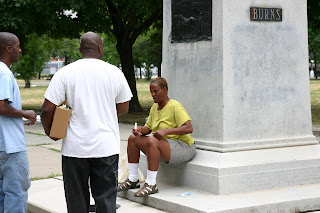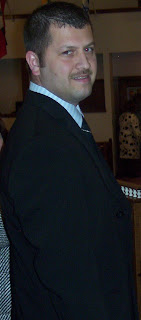
This song truly says it all, for any possible thing that we could be going through. If that little bitty sparrow is so important to Him, how much more are we--He shed His precious blood and took all of those stripes on his body just for us.
Why should I feel discouraged, why should the shadows come,Why should my heart be lonely, and long for heaven and home,When Jesus is my portion? My constant friend is He:His eye is on the sparrow, and I know He watches me;His eye is on the sparrow, and I know He watches me.
I sing because I'm happy,I sing because I'm free,For His eye is on the sparrow,And I know He watches me.
"Let not your heart be troubled," His tender word I hear,And resting on His goodness, I lose my doubts and fears;Though by the path He leadeth, but one step I may see;His eye is on the sparrow, and I know He watches me;His eye is on the sparrow, and I know He watches me.
I sing because I'm happy,I sing because I'm free,For His eye is on the sparrow,And I know He watches me.
Whenever I am tempted, whenever clouds arise,When songs give place to sighing, when hope within me dies,I draw the closer to Him, from care He sets me free;His eye is on the sparrow, and I know He watches me;His eye is on the sparrow, and I know He watches me.
I sing because I'm happy,I sing because I'm free,For His eye is on the sparrow,And I know He watches me.
_________________________________________________________
Words by Civilla D. Martin, 1905- Music Charles H. Gabriel, 1905
Civilla Martin wrote:"Early in the spring of 1905, my husband and I were sojourning in Elmira, New York. We contracted a deep friendship for a couple by the name of Mr. and Mrs. Doolittle, true saints of God. Mrs. Doolittle had been bedridden for nigh twenty years. Her husband was an incurable cripple who had to propel himself to and from his business in a wheel chair. Despite their afflictions, they lived happy Christian lives, bringing inspiration and comfort to all who knew them. One day while we were visiting with the Doolittles, my husband commented on their bright hopefulness and asked them for the secret of it. Mrs. Doolittle's reply was simple: "His eye is on the sparrow, and I know He watches me." The beauty of this simple expression of boundless faith gripped the hearts and fired the imagination of Dr. Martin and me. The hymn "His Eye Is on the Sparrow" was the outcome of that experience."The next day she mailed the poem to Charles Gabriel, who supplied the music. Singer Ethel Waters so loved this song that she used its name as the title for her autobiography.
Matthew 6:26 says: Behold the fowls of the air: for they sow not, neither do they reap, nor gather into barns; yet your heavenly Father feedeth them. Are ye not much better than they?
















